译林版(2019)必修第二册Unit 3 Festivals and Customs 单元复习课件(共16张PPT)
文档属性
| 名称 | 译林版(2019)必修第二册Unit 3 Festivals and Customs 单元复习课件(共16张PPT) | 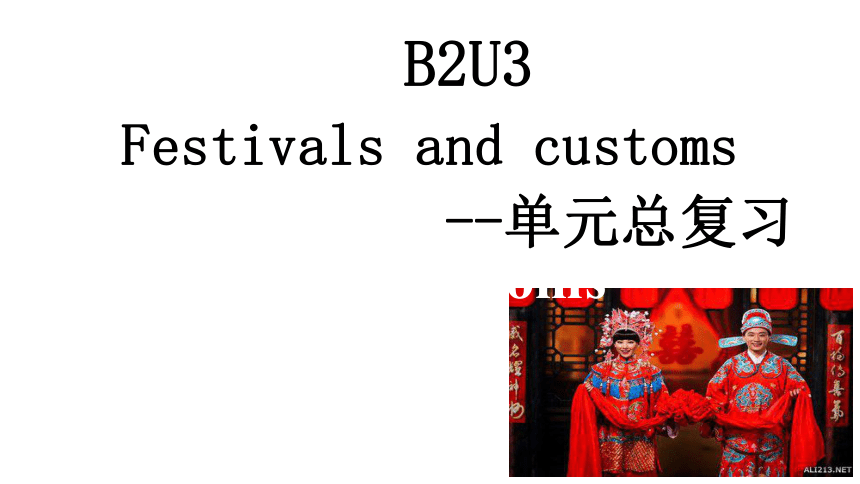 | |
| 格式 | pptx | ||
| 文件大小 | 220.3KB | ||
| 资源类型 | 教案 | ||
| 版本资源 | 牛津译林版(2019) | ||
| 科目 | 英语 | ||
| 更新时间 | 2023-08-05 21:33:37 | ||
图片预览

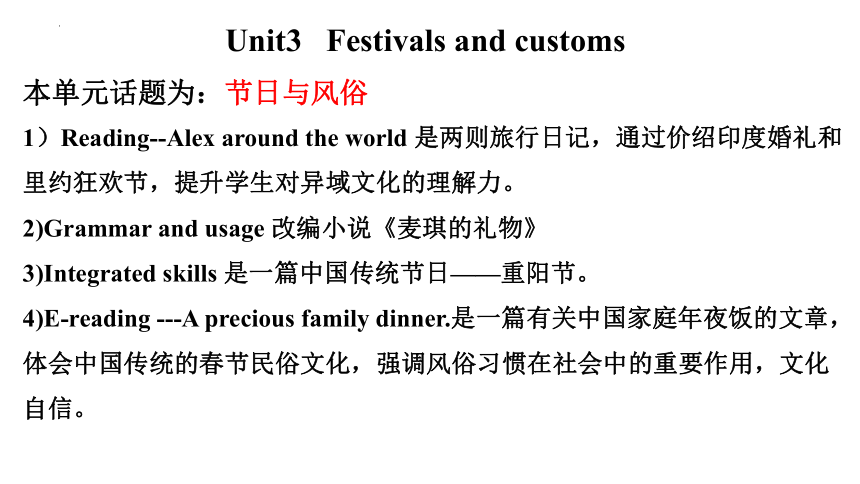
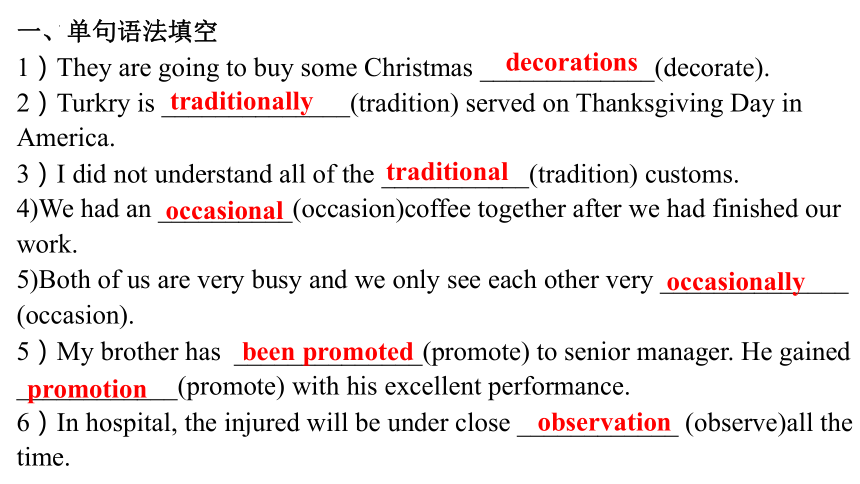
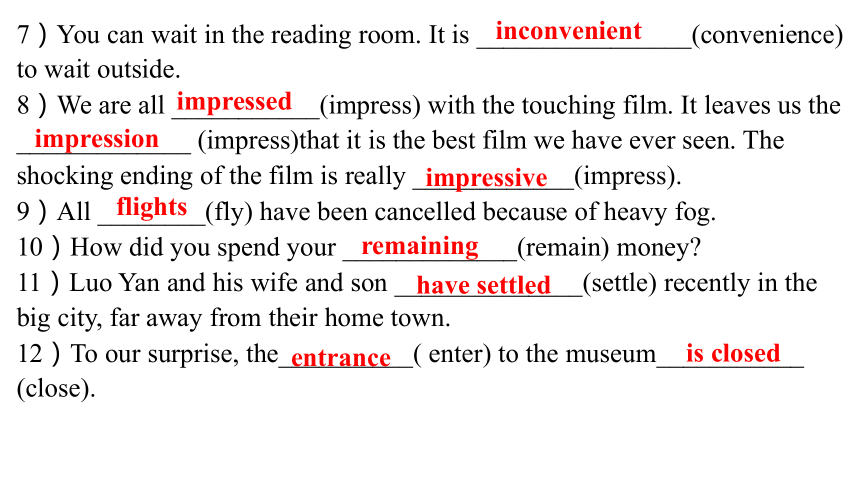
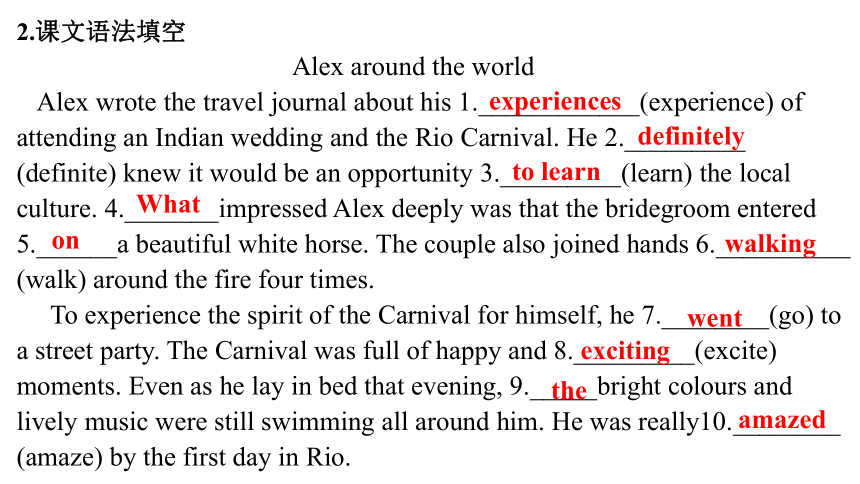
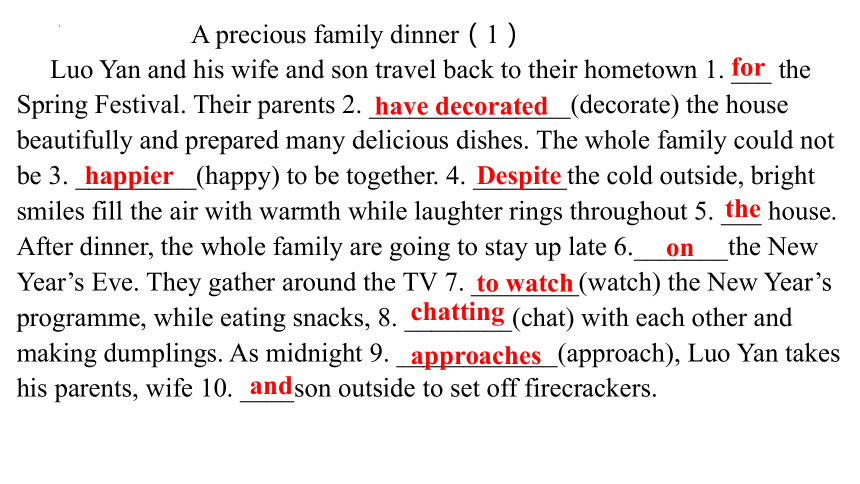
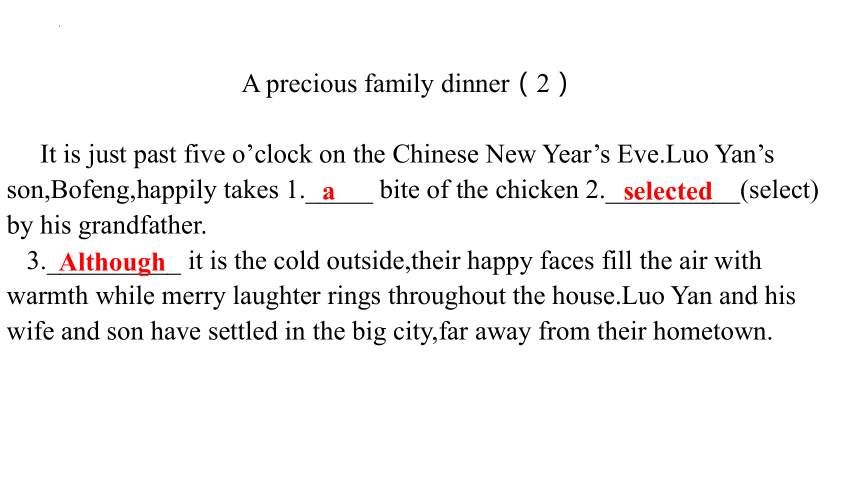
文档简介
(共16张PPT)
UNIT
3
Festivals
and
customs
B2U3
Festivals and customs
--单元总复习
Unit3 Festivals and customs
本单元话题为:节日与风俗
1)Reading--Alex around the world 是两则旅行日记,通过价绍印度婚礼和里约狂欢节,提升学生对异域文化的理解力。
2)Grammar and usage 改编小说《麦琪的礼物》
3)Integrated skills 是一篇中国传统节日——重阳节。
4)E-reading ---A precious family dinner.是一篇有关中国家庭年夜饭的文章,体会中国传统的春节民俗文化,强调风俗习惯在社会中的重要作用,文化自信。
一、单句语法填空
1)They are going to buy some Christmas _____________(decorate).
2)Turkry is ______________(tradition) served on Thanksgiving Day in America.
3)I did not understand all of the ___________(tradition) customs.
4)We had an __________(occasion)coffee together after we had finished our work.
5)Both of us are very busy and we only see each other very ______________
(occasion).
5)My brother has ______________(promote) to senior manager. He gained ____________(promote) with his excellent performance.
6)In hospital, the injured will be under close ____________ (observe)all the time.
decorations
traditionally
traditional
occasional
been promoted
promotion
observation
occasionally
7)You can wait in the reading room. It is ________________(convenience) to wait outside.
8)We are all ___________(impress) with the touching film. It leaves us the _____________ (impress)that it is the best film we have ever seen. The shocking ending of the film is really ____________(impress).
9)All ________(fly) have been cancelled because of heavy fog.
10)How did you spend your _____________(remain) money
11)Luo Yan and his wife and son ______________(settle) recently in the big city, far away from their home town.
12)To our surprise, the__________( enter) to the museum___________ (close).
inconvenient
impressed
impression
impressive
flights
remaining
have settled
entrance
is closed
2.课文语法填空
Alex around the world
Alex wrote the travel journal about his 1.____________(experience) of attending an Indian wedding and the Rio Carnival. He 2._________
(definite) knew it would be an opportunity 3._________(learn) the local culture. 4._______impressed Alex deeply was that the bridegroom entered 5.______a beautiful white horse. The couple also joined hands 6.__________ (walk) around the fire four times.
To experience the spirit of the Carnival for himself, he 7.________(go) to a street party. The Carnival was full of happy and 8._________(excite) moments. Even as he lay in bed that evening, 9._____bright colours and lively music were still swimming all around him. He was really10.________
(amaze) by the first day in Rio.
experiences
definitely
What
to learn
on
walking
went
exciting
the
amazed
A precious family dinner(1)
Luo Yan and his wife and son travel back to their hometown 1. ___ the Spring Festival. Their parents 2. _______________(decorate) the house beautifully and prepared many delicious dishes. The whole family could not be 3. _________(happy) to be together. 4. _______the cold outside, bright smiles fill the air with warmth while laughter rings throughout 5. ___ house. After dinner, the whole family are going to stay up late 6._______the New Year’s Eve. They gather around the TV 7. ________(watch) the New Year’s programme, while eating snacks, 8. ________(chat) with each other and making dumplings. As midnight 9. ____________(approach), Luo Yan takes his parents, wife 10. ____son outside to set off firecrackers.
for
have decorated
happier
Despite
on
the
to watch
chatting
approaches
and
A precious family dinner(2)
It is just past five o’clock on the Chinese New Year’s Eve.Luo Yan’s son,Bofeng,happily takes 1._____ bite of the chicken 2.__________(select) by his grandfather.
3.__________ it is the cold outside,their happy faces fill the air with warmth while merry laughter rings throughout the house.Luo Yan and his wife and son have settled in the big city,far away from their hometown.
a
selected
Although
On their arrival,they find Luo’s parents 4.__________(eager) waiting for them.Their home has been specially 5.____________(decorate) for the joyous occasion.6.___________(range) from the neat designs of the paper cuttings on the windows,to the New Year paintings on the wall,everything 7.___________(represent) joy,luck and happiness.8._________midnight approaching,Luo Yan takes his parents,wife and son outside 9.________
(set) off firecrackers.The whole village is lit up with colourful fireworks.
All over the country,people are celebrating their good fortune,celebrating their family’s togetherness,and celebrating their 10. ____________(nation) strength.
eagerly
Ranging
decorated
represents
With
to set
nation’s
3.Integrated skills 改编完形填空
The Double Ninth Festival (the Chongyang Festival), which has a 1.______of over 2000 years, fall on the ninth day of the ninth month in the Chinese 2.______calendar. According to tradition,n we should3.________the festival by going mountain climbing, but how many people today still 4.________ this tradition In modern society, many traditional Chinese festivals are becoming less and less popular. However, they are an important part of Chinese culture and we must protect and 5._______ them.
1.A. history B.culture
C. tradition D.modern
2. A.month’s B.lunar
C.solar D.year’s
3. A.improve B.practise
C.celebrate D.consist
4. A.notice B. look
C. advise D.observe
5. A.maintain B.remind
C.repair D.continue
Traditional festivals teach us a lot about our nation's history. The Dragon Boat Festival, for example, is celebrated in 6.________of Qu Yuan, a great poet 7._______in the Warring States period of ancient China. By celebrating the Dragon Boat Festival with rice dumplings and dragon boat races, the story of Qu Yuanis passed down from generation to generation. Promoting traditional festivals helps 8________ knowledge about our national history.
6.A.fame B.ceremony
C. honour D.duty
7.A.writing B.living
C.working D.drawing
8.A.spread B.stable
C.hold D.make
Moreover, traditional festivals enable us to learn more about fine Chinese values. Many festivals, such as the Mid-Autumn Festival, have a caring, family-centred message at their heart. The full moon on the festival is considered to stand for family 9.__________ and family members will come back home10.________ they live very far away. With the celebrations of these festivals, younger generations learn to honour fine Chinese values.
Finally, traditional festivals are a source of 11.______pride and help shape our
National12.________.
9.A.happiness B. safeness
C.kindness D.togetherness
10. A.as if B.even if
C. now that D.in case
11. A.festival B.cultural
C. national D.racial
12. A.sight B.view
C.site D.identity
For example, we celebrate the Hanshi Festival and the Laba Festival with 13.__________ customs, and these shared experiences bring us together as a people.
Traditional festivals tell us who we are and fill us 14.________ pride in being Chinese.
Traditional festivals have been passed down to us from 15._______ generations. It is the duty of every one of us to protect them for generations to come.
13.A.unique B.wonderful
C.specific D.splendid
14. A.on B.in
C.with D.at
15. A. later B. previous
C.current D.modern
七选五
The Dongzhi Festival in China, also called the Chinese Winter Solstice Festival, is one of the most important and popular festivals in China.1__________.Each year, the Winter Solstice falls between December 21 and 23. In Chinese tradition, there' S a saying that says Winter Solstice is more important than the Lunar New Year. Chinese people observed the laws of nature in ancient times, and found that the Winter Solstice is the shortest day of the year.2__________. Then how do the Chinese celebrate Winter Solstice Festival People in the North eat dumplings during the Winter Solstice. 3_______.
Because his dumpling soup had successfully cured the frostbitten ( 冻伤的)ears of many people, a saying was born:“If you don't eat dumplings a Winter Solstice, your ears will be frostbitten.”
D
C
G
4._________. Tangyuan, also called tangtuan or tuanzi, is a food made from glutinous rice flour (糯米粉). The character yuan means reunion (团圆) and that something is perfectly successful.
There' s also the custom of“counting nine”. 5 ___________:starting from the Winter Solstice day that begins with the“first nine” to the “ninth nine". Finally, after eighty-one days, the cold winter is gone.
A. Dumplings are a very popular food with a long history
B. It is a method created by ancient people to count days in winter
C. After that day, the daytime becomes longer and spring comes
D. It is a time to prepare for the New Year and spend time with the family
E. Eating tangyuan is another traditional custom popular in Southern China
F. No wonder there' S a saying: You will be one year older after having the Winter Solstice dinner
G. The custom is to remember Zhang Zhonging, a doctor who is thought to have invented dumplings
E
B
应用文写作
假设你是李华,你的美国朋友 Jonah来信说,想利用自己的假期来中国体验一下中国的传统节日。在端午节、中秋节和春节中,你会建议他选择哪个呢 请你回复邮件并说明推荐理由。注意:1.词数80左右;2.可以适当增加细节,以使行文连贯;3.开头与结尾已给出,不计入总词数。Dear Jonah, I’m glad to know that you are interested in Chinese traditional festivals and want to experience one of them.
________________________________________________________________________________________________________________________________ I am looking forward to your coming. Yours, Li Hua
Dear Jonah,
I’m glad to know that you are interested in Chinese traditional festivals and want to experience one of them. There are many traditional festivals in China,such as the Dragon Boat Festival,
the Mid-Autumn Festival and the Spring Festival.To be frank,the atmosphere of the Mid-Autumn Festival is absolutely significant.I really hope you can come and spend the festival with me. The Mid-Autumn Festival,a special occasion for family to gather,falls on the fifteenth day of the eighth month of the lunar year.The fifteenth day of the eighth month of the lunar year celebrates the harvest and people admire the beautiful moon with joy. After all,it is said that the moon that day is the biggest and brightest.It’s also a day to eat special foods like mooncakes.
I am looking forward to your coming. Yours, Li Hua
UNIT
3
Festivals
and
customs
B2U3
Festivals and customs
--单元总复习
Unit3 Festivals and customs
本单元话题为:节日与风俗
1)Reading--Alex around the world 是两则旅行日记,通过价绍印度婚礼和里约狂欢节,提升学生对异域文化的理解力。
2)Grammar and usage 改编小说《麦琪的礼物》
3)Integrated skills 是一篇中国传统节日——重阳节。
4)E-reading ---A precious family dinner.是一篇有关中国家庭年夜饭的文章,体会中国传统的春节民俗文化,强调风俗习惯在社会中的重要作用,文化自信。
一、单句语法填空
1)They are going to buy some Christmas _____________(decorate).
2)Turkry is ______________(tradition) served on Thanksgiving Day in America.
3)I did not understand all of the ___________(tradition) customs.
4)We had an __________(occasion)coffee together after we had finished our work.
5)Both of us are very busy and we only see each other very ______________
(occasion).
5)My brother has ______________(promote) to senior manager. He gained ____________(promote) with his excellent performance.
6)In hospital, the injured will be under close ____________ (observe)all the time.
decorations
traditionally
traditional
occasional
been promoted
promotion
observation
occasionally
7)You can wait in the reading room. It is ________________(convenience) to wait outside.
8)We are all ___________(impress) with the touching film. It leaves us the _____________ (impress)that it is the best film we have ever seen. The shocking ending of the film is really ____________(impress).
9)All ________(fly) have been cancelled because of heavy fog.
10)How did you spend your _____________(remain) money
11)Luo Yan and his wife and son ______________(settle) recently in the big city, far away from their home town.
12)To our surprise, the__________( enter) to the museum___________ (close).
inconvenient
impressed
impression
impressive
flights
remaining
have settled
entrance
is closed
2.课文语法填空
Alex around the world
Alex wrote the travel journal about his 1.____________(experience) of attending an Indian wedding and the Rio Carnival. He 2._________
(definite) knew it would be an opportunity 3._________(learn) the local culture. 4._______impressed Alex deeply was that the bridegroom entered 5.______a beautiful white horse. The couple also joined hands 6.__________ (walk) around the fire four times.
To experience the spirit of the Carnival for himself, he 7.________(go) to a street party. The Carnival was full of happy and 8._________(excite) moments. Even as he lay in bed that evening, 9._____bright colours and lively music were still swimming all around him. He was really10.________
(amaze) by the first day in Rio.
experiences
definitely
What
to learn
on
walking
went
exciting
the
amazed
A precious family dinner(1)
Luo Yan and his wife and son travel back to their hometown 1. ___ the Spring Festival. Their parents 2. _______________(decorate) the house beautifully and prepared many delicious dishes. The whole family could not be 3. _________(happy) to be together. 4. _______the cold outside, bright smiles fill the air with warmth while laughter rings throughout 5. ___ house. After dinner, the whole family are going to stay up late 6._______the New Year’s Eve. They gather around the TV 7. ________(watch) the New Year’s programme, while eating snacks, 8. ________(chat) with each other and making dumplings. As midnight 9. ____________(approach), Luo Yan takes his parents, wife 10. ____son outside to set off firecrackers.
for
have decorated
happier
Despite
on
the
to watch
chatting
approaches
and
A precious family dinner(2)
It is just past five o’clock on the Chinese New Year’s Eve.Luo Yan’s son,Bofeng,happily takes 1._____ bite of the chicken 2.__________(select) by his grandfather.
3.__________ it is the cold outside,their happy faces fill the air with warmth while merry laughter rings throughout the house.Luo Yan and his wife and son have settled in the big city,far away from their hometown.
a
selected
Although
On their arrival,they find Luo’s parents 4.__________(eager) waiting for them.Their home has been specially 5.____________(decorate) for the joyous occasion.6.___________(range) from the neat designs of the paper cuttings on the windows,to the New Year paintings on the wall,everything 7.___________(represent) joy,luck and happiness.8._________midnight approaching,Luo Yan takes his parents,wife and son outside 9.________
(set) off firecrackers.The whole village is lit up with colourful fireworks.
All over the country,people are celebrating their good fortune,celebrating their family’s togetherness,and celebrating their 10. ____________(nation) strength.
eagerly
Ranging
decorated
represents
With
to set
nation’s
3.Integrated skills 改编完形填空
The Double Ninth Festival (the Chongyang Festival), which has a 1.______of over 2000 years, fall on the ninth day of the ninth month in the Chinese 2.______calendar. According to tradition,n we should3.________the festival by going mountain climbing, but how many people today still 4.________ this tradition In modern society, many traditional Chinese festivals are becoming less and less popular. However, they are an important part of Chinese culture and we must protect and 5._______ them.
1.A. history B.culture
C. tradition D.modern
2. A.month’s B.lunar
C.solar D.year’s
3. A.improve B.practise
C.celebrate D.consist
4. A.notice B. look
C. advise D.observe
5. A.maintain B.remind
C.repair D.continue
Traditional festivals teach us a lot about our nation's history. The Dragon Boat Festival, for example, is celebrated in 6.________of Qu Yuan, a great poet 7._______in the Warring States period of ancient China. By celebrating the Dragon Boat Festival with rice dumplings and dragon boat races, the story of Qu Yuanis passed down from generation to generation. Promoting traditional festivals helps 8________ knowledge about our national history.
6.A.fame B.ceremony
C. honour D.duty
7.A.writing B.living
C.working D.drawing
8.A.spread B.stable
C.hold D.make
Moreover, traditional festivals enable us to learn more about fine Chinese values. Many festivals, such as the Mid-Autumn Festival, have a caring, family-centred message at their heart. The full moon on the festival is considered to stand for family 9.__________ and family members will come back home10.________ they live very far away. With the celebrations of these festivals, younger generations learn to honour fine Chinese values.
Finally, traditional festivals are a source of 11.______pride and help shape our
National12.________.
9.A.happiness B. safeness
C.kindness D.togetherness
10. A.as if B.even if
C. now that D.in case
11. A.festival B.cultural
C. national D.racial
12. A.sight B.view
C.site D.identity
For example, we celebrate the Hanshi Festival and the Laba Festival with 13.__________ customs, and these shared experiences bring us together as a people.
Traditional festivals tell us who we are and fill us 14.________ pride in being Chinese.
Traditional festivals have been passed down to us from 15._______ generations. It is the duty of every one of us to protect them for generations to come.
13.A.unique B.wonderful
C.specific D.splendid
14. A.on B.in
C.with D.at
15. A. later B. previous
C.current D.modern
七选五
The Dongzhi Festival in China, also called the Chinese Winter Solstice Festival, is one of the most important and popular festivals in China.1__________.Each year, the Winter Solstice falls between December 21 and 23. In Chinese tradition, there' S a saying that says Winter Solstice is more important than the Lunar New Year. Chinese people observed the laws of nature in ancient times, and found that the Winter Solstice is the shortest day of the year.2__________. Then how do the Chinese celebrate Winter Solstice Festival People in the North eat dumplings during the Winter Solstice. 3_______.
Because his dumpling soup had successfully cured the frostbitten ( 冻伤的)ears of many people, a saying was born:“If you don't eat dumplings a Winter Solstice, your ears will be frostbitten.”
D
C
G
4._________. Tangyuan, also called tangtuan or tuanzi, is a food made from glutinous rice flour (糯米粉). The character yuan means reunion (团圆) and that something is perfectly successful.
There' s also the custom of“counting nine”. 5 ___________:starting from the Winter Solstice day that begins with the“first nine” to the “ninth nine". Finally, after eighty-one days, the cold winter is gone.
A. Dumplings are a very popular food with a long history
B. It is a method created by ancient people to count days in winter
C. After that day, the daytime becomes longer and spring comes
D. It is a time to prepare for the New Year and spend time with the family
E. Eating tangyuan is another traditional custom popular in Southern China
F. No wonder there' S a saying: You will be one year older after having the Winter Solstice dinner
G. The custom is to remember Zhang Zhonging, a doctor who is thought to have invented dumplings
E
B
应用文写作
假设你是李华,你的美国朋友 Jonah来信说,想利用自己的假期来中国体验一下中国的传统节日。在端午节、中秋节和春节中,你会建议他选择哪个呢 请你回复邮件并说明推荐理由。注意:1.词数80左右;2.可以适当增加细节,以使行文连贯;3.开头与结尾已给出,不计入总词数。Dear Jonah, I’m glad to know that you are interested in Chinese traditional festivals and want to experience one of them.
________________________________________________________________________________________________________________________________ I am looking forward to your coming. Yours, Li Hua
Dear Jonah,
I’m glad to know that you are interested in Chinese traditional festivals and want to experience one of them. There are many traditional festivals in China,such as the Dragon Boat Festival,
the Mid-Autumn Festival and the Spring Festival.To be frank,the atmosphere of the Mid-Autumn Festival is absolutely significant.I really hope you can come and spend the festival with me. The Mid-Autumn Festival,a special occasion for family to gather,falls on the fifteenth day of the eighth month of the lunar year.The fifteenth day of the eighth month of the lunar year celebrates the harvest and people admire the beautiful moon with joy. After all,it is said that the moon that day is the biggest and brightest.It’s also a day to eat special foods like mooncakes.
I am looking forward to your coming. Yours, Li Hua
